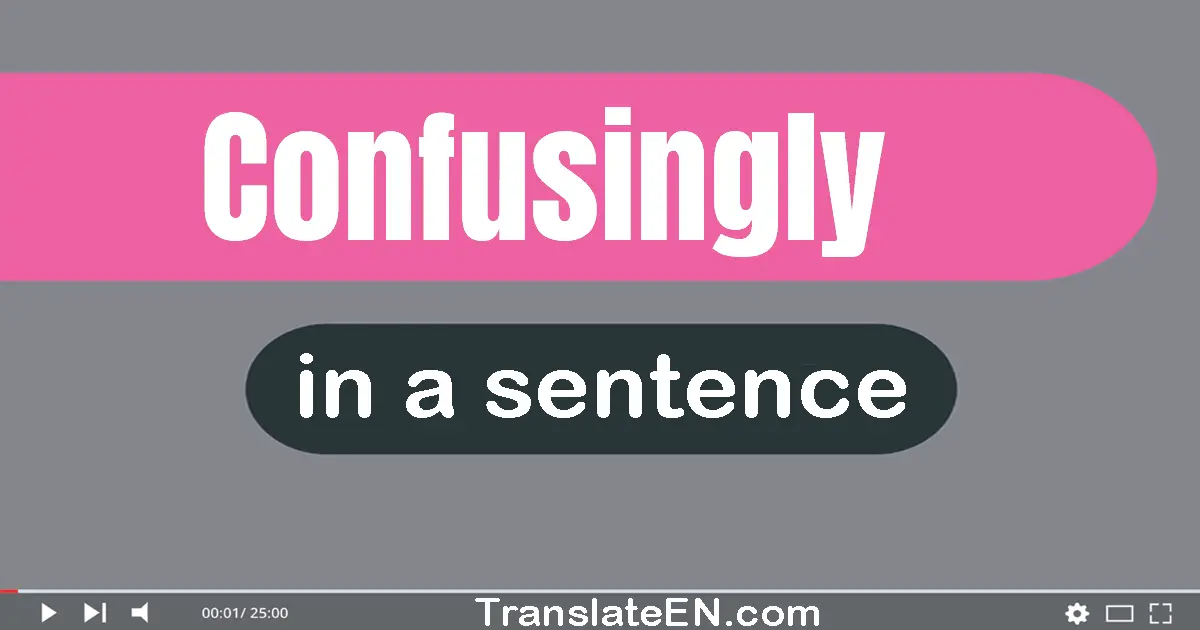Confusingly in a sentence
Synonym: bewilderingly. Antonym: clearly
Meaning: In a manner that causes confusion; often used to describe unclear communication.

(1) The website's navigation menu was confusingly labeled.
(2) The instructions on the package were confusingly vague.
(3) The website's search function was confusingly ineffective.
(4) The assembly instructions for the toy were confusingly written.
(5) The map was drawn confusingly, making it difficult to navigate.
(6) The instructions for assembling the puzzle were confusingly vague.
(7) The instructions for operating the machine were written confusingly.
(8) The exam question was convoluted around a confusingly worded prompt.
(9) The instructions for using the new software were confusingly complex.
(10) The instructions for assembling the furniture were written confusingly.
Confusingly sentence
(11) The plot of the movie was confusingly complex, making it hard to follow.
(12) The teacher explained the concept confusingly, leaving the students confused.
(13) The signs on the road were confusingly placed, leading to traffic congestion.
(14) Trade marks can be used to prevent others from using confusingly similar marks.
(15) The menu at the restaurant was confusingly organized, making it hard to choose.
(16) The directions to the event were confusingly written, causing many people to get lost.
(17) Trademarks can be used to prevent others from using a mark that is confusingly similar.
(18) The instructions for assembling the furniture were confusingly translated, causing errors.
(19) The rules of the game were confusingly explained, leading to misunderstandings among players.
(20) The new software was confusingly different from the old version, causing frustration for users.
(21) Trade-mark infringement occurs when someone uses a mark that is confusingly similar to an existing trade-mark.
Confusingly meaning
Confusingly is an adverb that is used to describe something that is difficult to understand or comprehend. It is often used to describe situations or actions that are perplexing or unclear. If you are looking to use the word confusingly in a sentence, there are a few tips that you should keep in mind.
Firstly, it is important to understand the context in which the word is being used. Confusingly can be used in a variety of situations, from describing a complex scientific concept to explaining a difficult social issue. Understanding the context will help you to use the word in a way that is appropriate and effective.
Secondly, it is important to use the word in a way that is grammatically correct. Confusingly is an adverb, which means that it should be used to modify a verb, adjective, or other adverb.
For example, you might say "The instructions were confusingly written," or "She spoke confusingly about the topic."
Thirdly, it is important to use the word in a way that is clear and concise. Confusingly is a word that can be overused or misused, so it is important to use it sparingly and only when it is necessary. If you are unsure about how to use the word, it may be helpful to consult a dictionary or thesaurus to find alternative words or phrases that convey the same meaning.
Finally, it is important to practice using the word in context. The more you use the word confusingly in sentences, the more comfortable you will become with its meaning and usage. You may also find it helpful to read examples of how other writers have used the word in their work, as this can provide inspiration and guidance for your own writing.
In conclusion, confusingly is a useful word that can be used to describe a wide range of situations and actions. By following these tips, you can use the word in a way that is appropriate, effective, and clear. With practice, you can become a master of using confusingly in your writing and communication.
The word usage examples above have been gathered from various sources to reflect current and historical usage of the word Confusingly. They do not represent the opinions of TranslateEN.com.
